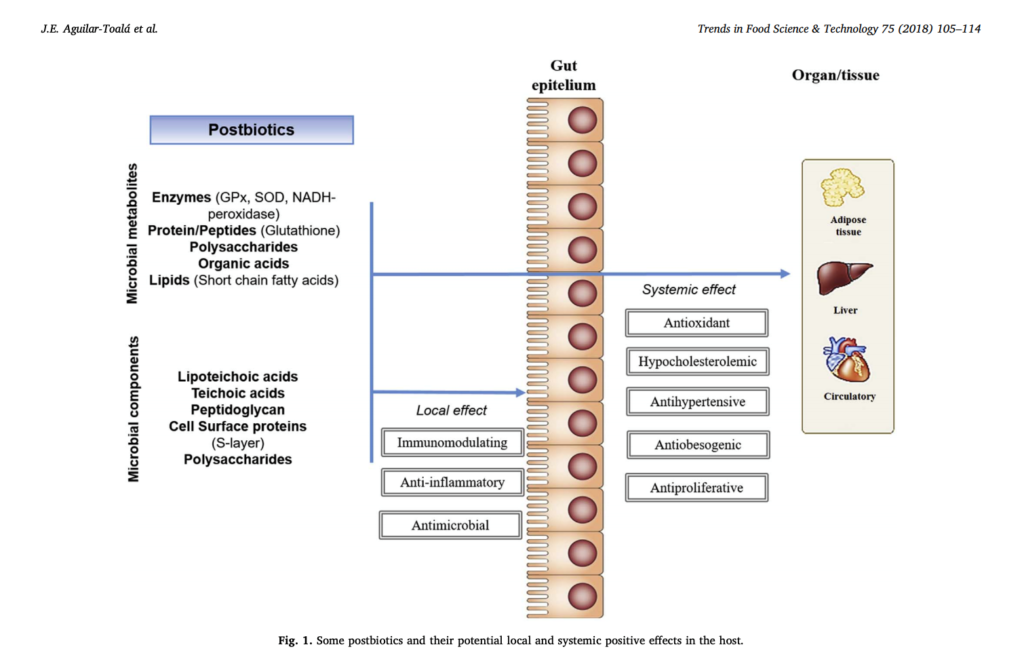
At this point almost everyone is aware of the benefits of probiotics, but postbiotics is a new term for most of us. These are byproducts of probiotics’ fermentation process inside your intestines, and recent research presents evidence that most of the positive effects we used to attribute to probiotics might actually be due to postbiotics – wait, what?!
What Are POSTBIOTICS?
To put it simply, prebiotics proceed and are needed for the creation of probiotics, and probiotics proceed and are needed for the creation of postbiotics:
Prebiotics: Prebiotics are the “food” for the probiotics. They are types of dietary fiber that feed the friendly bacteria in the gut, which helps them to survive and thrive.
Probiotics: Probiotics are the live microorganisms themselves. They have been credited with promoting a multitude of health benefits including gut health, inflammation, mood support, and weight loss.
Postbiotics: Postbiotics are created when the probiotics eat the prebiotics. Often called “metabolites”, as they are the result of a metabolic process, these components result from probiotic activity in the gut, like fermentation.
Just as different strains of probiotics provide different health benefits, they also produce different kinds of metabolites. These “postbiotic metabolites” can fall into many different categories:
- Bacteriocins – Protective compounds that kill off or inhibit the growth of unwanted bacteria.
- Enzymes – Help with the digestive process and aid in detoxification.
- Vitamins – For example, the B vitamins and vitamin K.
- Amino acids – The building blocks of protein.
- Neurotransmitters – Carry messages between the nerves and the brain.
- Immune-signaling compounds – Help support the body’s immune cells.
- Short-chain fatty acids – Help keep the intestinal lining strong and healthy.
- Nitric oxide – Critical for cardiovascular health.
- Organic acids – For example, fulvic and humic acids. They combine with minerals, making them easier to absorb and help maintain the correct pH in the GI tract.
Additionally, just as a wide range and variety of probiotics have been shown to be beneficial in improving overall health and helping to improve specific health conditions, research to date indicates that postbiotics provide very similar direct and significant health benefits.

Benefits of Postbiotics
Many elements in our environment impact our overall health. Some of these are easily within our control, such as getting enough water and exercise or limiting the amount of junk food we eat. Meanwhile there are also things that may have a negative effect on us that we aren’t even aware of or are more difficult for us to control, such as many medications, chlorine in our drinking water, pesticides on our lawns or chemicals in our home-cleaning products. These negative factors can reduce the overall density and diversity of our intestinal bacteria, which is why so many people now look to probiotic dietary supplements for support.
As we are now recognizing the additional benefits of postbiotics in these formulations, we can begin to think about how we would formulate and position a private label supplement to take advantage of these benefits. Here are some of the many health benefits that postbiotics can offer:
1. Supports probiotics – Of course, probiotics and postbiotics are going to work together, along with prebiotics, in their own symbiotic dynamic. But far beyond being just a food source for probiotics, as prebiotics are, postbiotics actually work together with probiotics to provide beneficial effects on human health.
2. May help lower blood sugar and prevent obesity – A lack of intestinal microbe balance has been shown to contribute to obesity and insulin resistance. A postbiotic bacterial component called muramyl dipeptide has been shown to relieve glucose intolerance by increasing insulin sensitivity.
3. Treats Diarrhea – It has been long known that probiotic foods and supplements can be helpful in treating diarrhea. Research is now showing that this benefit is actually mostly due to the postbiotics, rather than the prebiotics themselves.
4. Antimicrobial properties – Like probiotics do, postbiotics also populate within the gut to effectively replace the growth of “bad bacteria”, contributing to a healthier ecosystem. They also possess bacteria-fighting properties to help fight infection.
Advantages in Formulating Private Label Supplements with Postbiotics
Postbiotics can be included into your private label probiotic supplement in a couple of ways. The postbiotics can be produced on their own, in a lab, and then added into these formulations to form complete “biotic formulas” (just wait – you’ll be seeing this soon), or your probiotic manufacturer can help you develop your product using a variety of prebiotics and probiotics with the goal of creating a diverse postbiotic matrix.
There are some advantages in formulating with, or with the goal of creating, postbiotics in your private label probiotic supplement:
Provides an Option for those with Autoimmune Conditions – Sometimes, live probiotics can signal various organs and tissues in the host to react in a way that causes a negative effect – like with an autoimmune disease where the immune system mistakenly attacks the body. As the postbiotics are not unfamiliar in the gut like some of these probiotics strains can be, they are considered to be a safe alternative for those with autoimmune conditions. Additionally, people with inflammatory bowel conditions (IBD, IBS, Crohn’s, Colitis, etc.) may not benefit from probiotics, and in fact they may inflame those conditions (pun intended). Postbiotics, however, may actually protect against this inflammation.
An Opportunity to Increase Shelf-Life of Benefits – There are two main challenges with private label probioticsupplements and postbiotics helps with both of them:
1) Stability. It is a challenge to work with live organisms and not kill or injure them during the manufacturing process.
2) Shelf-life. As they are alive, they basically start dying the minute they are created, and typically only survive for 2 to 3 years in any amount that is still beneficial for health.
If you choose to work with your manufacturing partner to create a postbiotic blend for your private label formula, you end up with components, the metabolites, that provide just as many health benefits as probiotics but are not alive. Therefore, they are much more stable to manufacture with and should provide for a longer shelf-life, as well.
Postbiotics are gaining attention in the world of dietary supplement and functional food manufacturing because of their clinically-supported health benefits, safety for a previously unaddressed population (the immunocompromized), longer shelf life, and stability during the manufacturing process.
Expect to see and hear more about postbiotics over the next several months and years, as they are likely to be the next up-and-coming health-boosting component in the world of probiotic products.
If you would like to see more information about new trends in nutritional science, please follow us on Facebook or Linkedin so you can stay up to date with our latest content.




